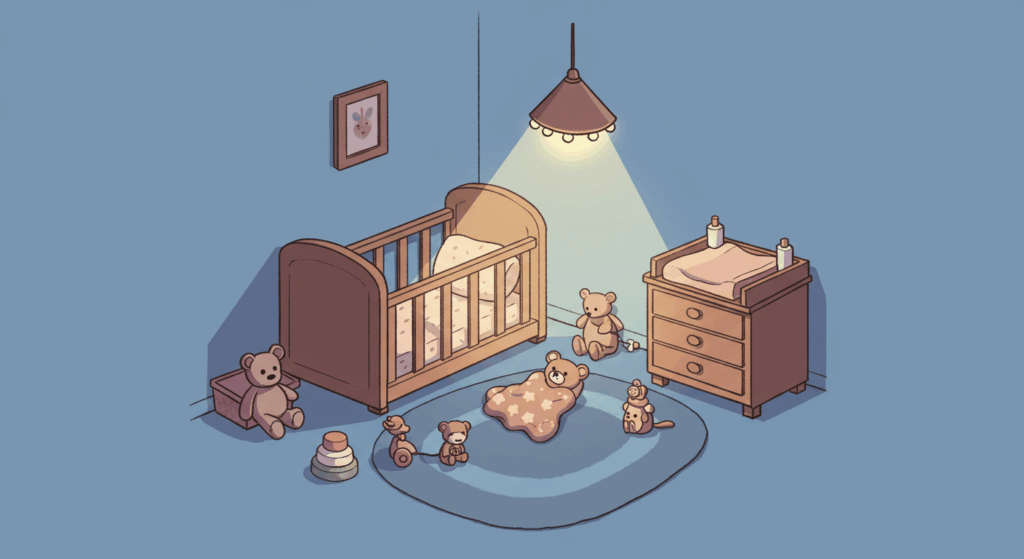One of the biggest shocks for most new parents? Babies don’t come with an off-switch.
In the early weeks, it may feel like your baby sleeps all day and then wakes up just when you’re finally ready for bed. Add in Nigeria’s unique challenges – humid Lagos nights, harmattan dryness, inconsistent power supply, and mosquito battles – and you’ve got a recipe for some very long nights.

But don’t worry. With gentle structure, a calming environment, and a consistent baby sleep routine, you can teach your little one the difference between night and day, help them sleep better, and catch some much-needed rest yourself.
This guide is your one-stop resource for understanding sleep cycles, building a baby sleep routine that works in Nigerian homes, and learning practical tips that other mums swear by. Whether you’re navigating noisy neighbours, hot nights, or cultural advice from grannies, you’ll find clarity, comfort, and confidence here.
Why a Baby Sleep Routine Matters
Many new mums assume that babies will just “figure out sleep” on their own. While that’s partly true -babies’ brains are wired to develop sleep patterns – what you do as a parent makes a big difference.
A baby sleep routine acts as a signal to your baby’s body and brain: “It’s time to rest.” Just like adults use rituals – taking a shower, dimming lights, or sipping tea – babies respond to predictable cues.
Inconsistent routines can confuse babies. Sometimes they’ll nap during the day and stay up at night, or they’ll expect playtime after every feed. A consistent baby sleep routine teaches them to settle faster, sleep longer, and feel more secure.
Plus, having a set baby sleep routine benefits mums too. It reduces stress, creates moments of calm, and gives you back some structure in your day.
Understanding Newborn Sleep Cycles
According to Better Health Channel, Babies sleep in short bursts, known as sleep cycles with Newborns sleep being around 20 to 50 minutes long
Before you create a baby sleep routine, it’s important to know what’s normal. Newborns are not mini-adults. Their sleep works differently:
- 14–17 hours a day (but broken into naps)
- Short wake windows of 30–90 minutes
- Light, noisy sleep with lots of movement
- Frequent night wakings for feeds
Their internal clocks (circadian rhythms) don’t fully kick in until 6–8 weeks. That’s why the early days feel chaotic. But by gently guiding them with a baby sleep routine, you can help their bodies learn when it’s time for longer stretches of rest.
Why Your Baby Might Struggle to Sleep at Night
If your baby wakes up every 30 minutes, cries whenever you lay them down, or only sleeps on your chest, you’re not alone. Many Nigerian mums face this too. Common culprits include:
- Overstimulation in the evening – too much play, bright lights, or loud TV can keep them wired.
- No consistent baby sleep routine – without repetition, babies don’t know what comes next.
- Too much daytime sleep – long naps can rob night sleep.
- Discomfort – gas, wet diapers, harmattan dryness, or overheating from PHCN outages.
- Confused day/night cues – babies need sunlight exposure in the day and dimness at night.
Identifying the reason makes it easier to adjust your baby sleep routine effectively.
How to Build a Simple Baby Sleep Routine
Consistency matters more than perfection. A good baby sleep routine doesn’t have to be long or complicated, it just needs to be predictable.
Sample Nighttime Baby Sleep Routine

- Warm bath – calming, especially in hot weather.
- Gentle massage – use baby oil or shea butter.
- Dress for comfort – breathable cotton sleepsuit or vest.
- Dim lights – tell the brain it’s night.
- Quiet feed – keep night feeds calm and focused.
- Lullaby or white noise – Yoruba lullabies, rainfall recordings, or heartbeat sounds work well.
- Cuddle or rock gently – but lay baby down drowsy, not fully asleep.
Repeat this baby sleep routine nightly. Over time, your baby will learn: “This sequence means bedtime.”
Baby Sleep Routine Tips for Nigerian Homes
Our climate and environment make sleep tricky, but small adjustments help.
1. Keep the Room Cool
- Use a ceiling or standing fan (not directly on baby).
- Open windows for airflow if safe.
- Choose light cotton sheets and clothes.
2. Protect from Mosquitoes
- Always use a baby net.
- Consider baby-safe repellents in harmattan months.
- Keep windows screened.
3. Reduce Noise
- Lagos traffic and generators can be loud – mask sounds with white noise.
- Keep voices low during night feeds.
4. Control Light

- Use blackout curtains to block harsh streetlights.
- Avoid phone brightness during feeds.
Adapting your baby sleep routine to Nigerian realities makes it practical and sustainable.
Safe Sleep Guidelines Every Mum Should Know
Your baby sleep routine should always prioritize safety. Doctors recommend:
- Put baby on their back to sleep.
- Use a firm mattress, no pillows or stuffed animals.
- Keep baby in their own cot or bassinet, in your room if possible.
- Avoid overheating – dress in layers and adjust with the weather.
What to avoid:
- Co-sleeping on couches or soft beds.
- Loose blankets or heavy duvets.
- Herbal sleep remedies for newborns.
Nigerian Mum Tips That Work
Sometimes, advice from other mums is gold. Here’s what Nigerian mums swear by for a smoother baby sleep routine:
- “Expose baby to sunlight in the morning” – helps them know it’s daytime.
- “Avoid too much play after 7 pm” – overstimulation delays sleep.
- “Sing lullabies in your dialect” – your familiar voice is the best white noise.
- “Fan + mosquito net combo” – keeps baby cool and bite-free.
- “Keep night feeds boring” – no TV or bright lights.
These small cultural practices make a baby sleep routine uniquely effective in Nigerian homes.
When to Expect Longer Sleep Stretches
A consistent baby sleep routine pays off, but progress is gradual:
- 8–12 weeks – some babies sleep 4–6 hours at a time.
- 3–6 months – many sleep 6–8 hours with routine.
- Growth spurts – expect temporary disruptions.
- Sleep regressions at 4 months and 8 months are common.
Don’t compare your baby’s sleep to another mum’s. Every child is unique. Stick to your baby sleep routine and trust the process.
Day and Night Separation: A Crucial Step
Babies don’t know the difference between night and day yet. You must teach them through your baby sleep routine:
- Daytime: Keep lights on, talk, and play after feeds.
- Nighttime: Keep it dim, quiet, and boring.
Over time, their brains will adjust, and they’ll begin consolidating more sleep at night.
Extra Calming Tools for Your Baby Sleep Routine
- Swaddling – mimics the womb, prevents startling awake.
- White noise machines – rainfall, heartbeat, or gentle shushing.
- Comforting scents – a familiar cloth near (not in) the crib.
- Massage oils – shea butter or coconut oil massages relax babies.
Used consistently, these tools make your baby sleep routine more effective.
When Sleep Troubles Signal Something Else
Sometimes, a disrupted baby sleep routine points to more than fussiness. Call your doctor if:
- Baby cries inconsolably for hours.
- Baby has fever, diarrhea, or vomiting.
- Baby struggles to breathe while sleeping.
- Baby arches back or seems stiff.
Trust your instincts – mothers know when something feels “off.”
How to Stay Calm as a Mum
A fussy baby plus broken sleep can leave any mum overwhelmed. Part of a successful baby sleep routine is caring for yourself:
- Place baby in a safe cot and take 5 minutes to breathe.
- Ask for help from family or a trusted caregiver.
- Play calming music for both you and baby.
- Remember: sleepless nights are temporary.
Your wellbeing is as important as your baby’s.
Final Thoughts
Helping your baby sleep better at night isn’t about perfection, it’s about building consistency, comfort, and calm. A baby sleep routine tailored to your home, culture, and baby’s needs will bring peace to your nights.
It won’t happen overnight, but with patience, Nigerian mums everywhere prove that a structured baby sleep routine works wonders.
Chikaro offers breathable cotton sleepwear, swaddles, and calming bath kits to make your baby sleep routine smoother.
You’ve got this and you’re not alone.






